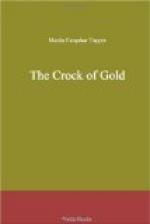But stop: let us hear the other side; it is possible we may have been mistaken. Bailiffs are never popular, particularly if they are too honest, and this one is a stern man with a repulsive manner. Who knows whether his advice to Acton may not have been wise and kind, and would not have conduced to a general rise of wages? Who can prove, nay, venture to insinuate, any such systematic roguery against a man hitherto so strict, so punctual, so sanctimonious? Even in the case of Sir John’s golden gift, Jennings may be right after all; it is quite possible that Roger was mistaken, and had gilt a piece of silver with his longings; and the upright man might well take umbrage at so vile an imputation as that hot and silly speech; it was foolish, very foolish, to have quoted text against him, and no wonder that the labourer got dismissed for it. Then again to return to wages—who knows? it might be, all things considered, the only way of managing a rise; the bailiff must know his master’s mind best, and Acton had been wise to have done as he bade him; perhaps it really was well-meant, and might have got him twelve shillings a-week, instead of eight as hitherto; perhaps Simon was a shrewd man, and arranged it cleverly; perhaps Roger was an honest man, and couldn’t but think others so.
Any how, though, all was lost now, and he blamed his own rash tongue, poor fellow, for what he could not help fearing was the ruin of himself and all he loved. With a melancholy heart, he shouldered his spade, and slowly plodded homewards. How long should he have a home? How was he to get bread, to get work, if the bailiff was his enemy? How could he face his wife, and tell her all the foolish past and dreadful future? How could he bear to look on Grace, too beautiful Grace, and torture his heart by fancying her fate? Thomas, too, his own brave boy, whom utter poverty might drive to desperation? And the poor babes, his little playful pets, what on earth would become of them? There was the Union workhouse to be sure, but Acton shuddered at the thought; to be separated from every thing he loved, to give up his little all, and be made both a prisoner and a slave, all for the sake of what?—daily water-gruel, and a pauper’s branded livery. Or they might perchance go beyond the seas, if some Prince Edward’s Company would help him and his to emigrate; ay, thought he, and run new risks, encounter fresh dangers, lose every thing, get nothing, and all the trouble taken merely to starve three thousand miles from home. No, no; at his time of life, he could not be leaving for ever old friends, old habits, old fields, old home, old neighbourhood—where he had seen the saplings grow up trees, and the quick toppings change into a ten-foot hedge; where the very cattle knew his step, and the clods broke kindly to his ploughshare; and more than all, the dear old church, where his forefathers had worshipped from the Conquest, and the old mounds where they slept, and—and—and—that one precious grave of his dear lost Annie—could he leave it? Oh God, no! he had done no ill, he had committed no crime—why should he prefer the convict’s doom, and seek to be transported for life?




